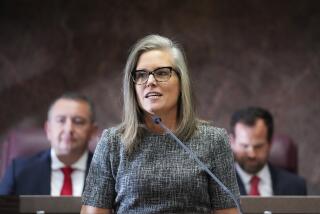Low-Income Parents Praise Voucher Proposal
- Share via
Theresa Simpson reluctantly took her son Bruce out of parochial school because she couldn’t afford the $1,200 annual tuition. Simpson, a single mother of three from San Pedro on a fixed income, says she would leap at the chance to return Bruce, now 16, to a private school with top-flight academics, religious training and a path to college.
She might get that chance.
Like other parents across Los Angeles, Simpson on Tuesday welcomed the news that Wall Street investor Theodore J. Forstmann would offer $20 million worth of $1,000 annual vouchers to help low-income families send their children to private schools.
The offer was celebrated as a boon for poor parents and the parochial schools that serve as an inexpensive alternative to highbrow private campuses, where a year’s tuition can cost more than a new car.
Indeed, the voucher plan renewed Simpson’s hope of finding a quality education for Bruce, a San Pedro High junior, and her 11-year-old foster son, Carlos.
“If it materializes, I’d jump at the chance,” said Simpson, 41, the office manager for the community group Parents of Watts. “Public schools are not enough anymore. They’re so overcrowded. The teachers have a really hard way to go.”
Forstmann, who is pitching his voucher donations as a way of breaking up what he terms the ineffective monopoly of public schools, said Monday that he would begin offering them in fall 1999. He said at least 5,000 vouchers probably would be issued annually for four years.
Struggling parents whose children now attend parochial schools said they too hope to benefit from the Forstmann initiative.
Darlene Anderson, whose two children attend the school at Our Savior’s First Lutheran Church in Granada Hills, said she has been considering pulling them out because of the high cost. Tuition is $2,750 per student.
Anderson, who is unemployed, and her husband, an electronics technician, moved into a cheaper apartment and tightened their belts to pay the nearly $6,000 bill at the school. The $2,000 they would receive if they qualified for a voucher would lighten the load considerably, she said.
Parochial schools already are far less expensive than secular private schools.
The average tuition is $1,303 for Catholic elementary campuses in the United States and $3,100 for secondary schools, according to the National Catholic Educational Assn., whose schools account for half of the private campuses nationwide. In comparison, tuition at secular private schools in the western United States can run as high as $16,500, according to the National Assn. of Independent Schools.
Administrators at parochial schools in Los Angeles predicted that Forstmann’s offer would draw ever larger numbers of students and resources to campuses that serve the children of poor and middle-income families and often operate on shoestring budgets.
The Archdiocese of Los Angeles stands to be one of the big winners. Its affiliated agencies operate 285 Catholic schools, with more than 100,000 students, in Los Angeles, Ventura and Santa Barbara counties.
The archdiocese provides $5 million in assistance to keep tuition low in poor neighborhoods, plus $3.5 million for families who can’t afford the lower rates. Schools in poor neighborhoods operate at about 80% capacity, and so have room for new students, said Jerome R. Porath, the archdiocese’s superintendent of schools.
“It’s positive news for families who can’t afford parochial education,” Porath said.
The arrival of voucher dollars in Los Angeles also is expected to benefit moderately priced private campuses such as Marcus Garvey School in South Los Angeles, where administrators routinely turn poor parents away because they can’t pay the $5,000-a-year price.
School founder Anyim Palmer said: “I don’t see how anyone who has children and is in need of assistance could be against the voucher.”
More to Read
Sign up for Essential California
The most important California stories and recommendations in your inbox every morning.
You may occasionally receive promotional content from the Los Angeles Times.










